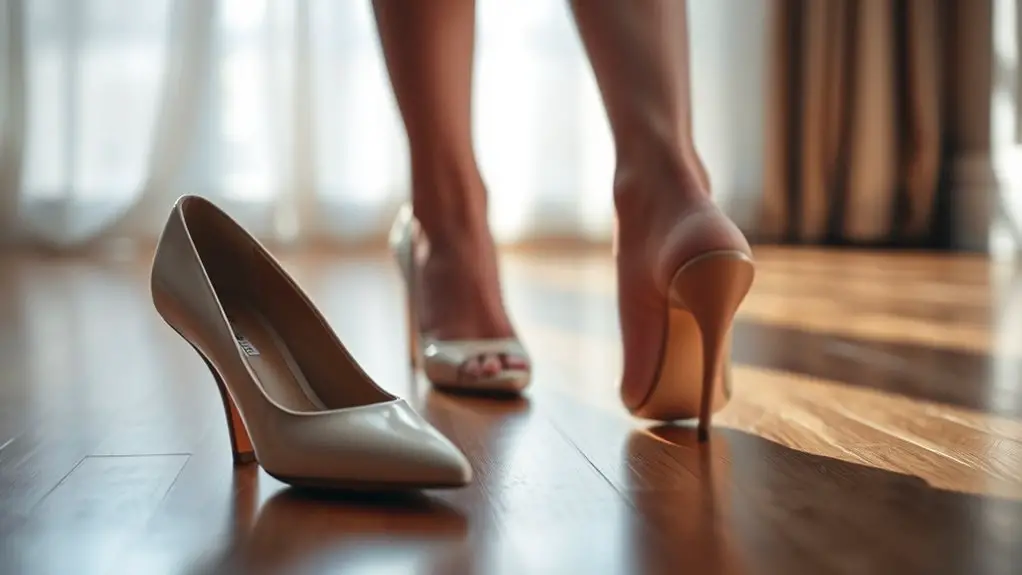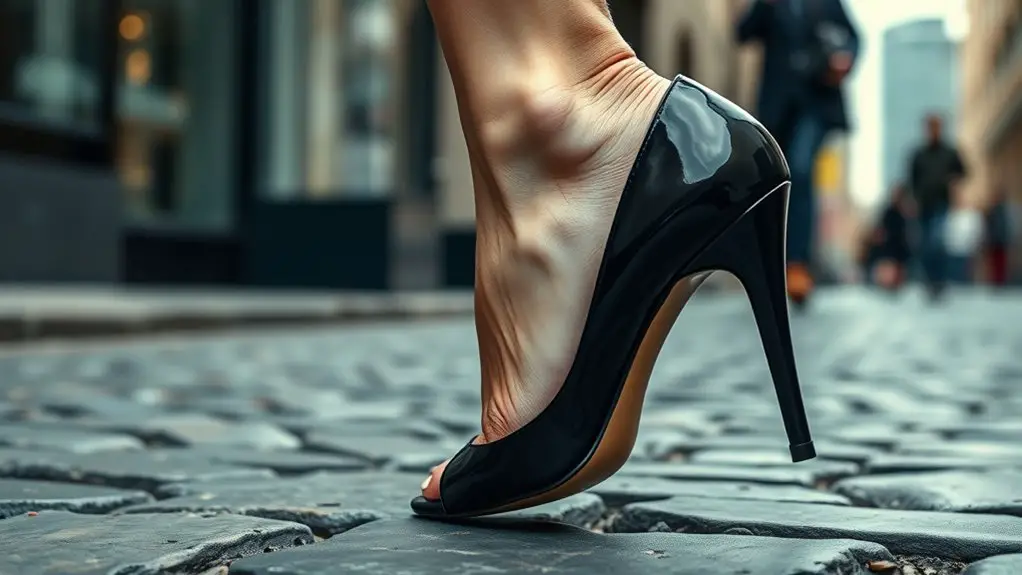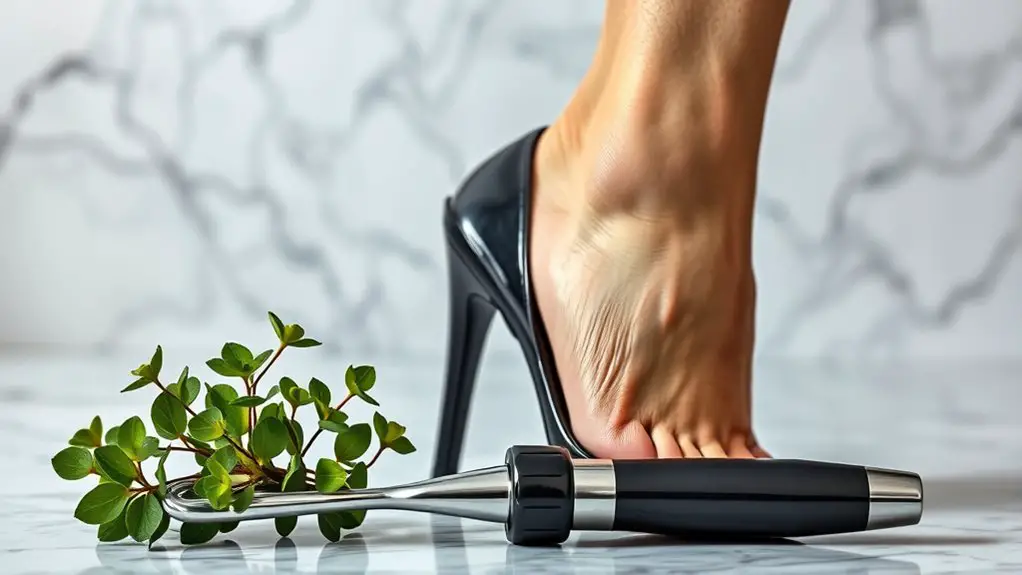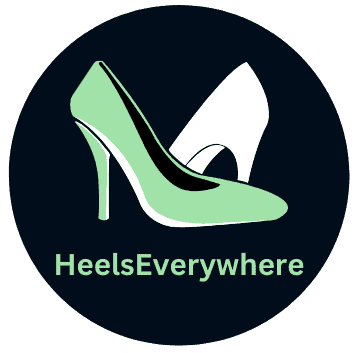Wearing high heels can indeed increase your risk of developing varicose veins. The added pressure from heels reduces the efficiency of your calf muscles, impairing blood flow. Prolonged use alters your foot posture, which strains surrounding tissues and contributes to vascular issues. If you frequently wear high heels, consider supportive footwear and take steps to maintain healthy circulation. For a deeper understanding of how to protect your legs, explore useful tips and alternatives.
Understanding Varicose Veins: Causes and Symptoms

Although they’re often seen as a cosmetic concern, varicose veins can signal underlying vascular issues. These swollen, twisted veins occur when blood pools due to improper functioning of the vein valves. You might notice symptoms like aching, heaviness, or swelling in your legs, especially after prolonged standing or sitting.
Understanding the risk factors is vital. Genetics play a significant role; if your family has a history of varicose veins, you’re more likely to develop them. Age is another factor, as veins can weaken over time. Hormonal changes, particularly in women during pregnancy or menopause, can also contribute. Lifestyle choices, such as a sedentary lifestyle or obesity, further increase your risk.
Recognizing these symptoms and understanding the risk factors can help you take preventive measures and seek appropriate treatment if needed. Prioritizing vascular health is essential for your overall well-being.
The Mechanics of Leg Circulation
Leg circulation is a complex but essential process that guarantees blood flows efficiently between the heart and the lower extremities. Central to this process is venous return, which relies heavily on the effective functioning of the calf muscles. As you walk or engage in physical activity, the calf muscles contract and relax, acting as a pump that propels blood upward toward the heart.
This muscle pump is significant because blood in the veins must overcome gravity to return to the heart. The presence of one-way valves in the veins further aids this process by preventing backflow. When these mechanisms function effectively, they support healthy circulation. However, factors like prolonged standing, inactivity, or tight clothing can impair venous return, leading to issues such as swelling or varicose veins. Understanding these mechanics can help you appreciate the importance of leg health in overall well-being.
How High Heels Affect Vein Health

Wearing high heels can greatly impact vein health, particularly by altering the natural mechanics of leg circulation. When you wear heels, the increased heel height shifts your foot posture, which can lead to several vascular issues.
- Increased pressure on veins
- Reduced calf muscle pump efficiency
- Impaired blood flow in the legs
- Strain on surrounding tissues
- Higher risk of developing varicose veins
The altered foot posture caused by high heels can hinder the calf muscles’ ability to effectively pump blood back to the heart. This increased pressure may lead to the dilation of veins, contributing to the formation of varicose veins over time. Furthermore, prolonged use of high heels exacerbates these issues, making it vital to be aware of how your footwear choices can affect your vein health in the long run. Prioritizing comfort and support is essential for maintaining ideal circulation.
Alternatives to High Heels for Better Circulation
What options do you have if you want to prioritize both style and circulation? You can choose comfortable footwear that supports your feet and promotes healthy blood flow. Supportive shoes with lower heels and arch support can greatly reduce strain on your veins, preventing conditions like varicose veins.
| Type of Footwear | Style | Benefits |
|---|---|---|
| Ballet Flats | Chic | Flexible and room for toes |
| Wedges | Trendy | Elevation without excessive height |
| Sneakers | Casual | Cushioned support for daily wear |
| Ankle Boots | Fashionable | Stylish yet supportive |
| Loafers | Classic | Easy to wear with various outfits |
Tips for Maintaining Healthy Legs While Wearing Heels

Although high heels can elevate your style, they often come with the risk of discomfort and potential health issues like varicose veins. To help maintain healthy legs while wearing heels, consider these essential tips:
- Perform leg exercises regularly to improve circulation.
- Choose heels with a lower height and better arch support.
- Take breaks to rest your legs and feet throughout the day.
- Wear compression stockings to promote blood flow and reduce swelling.
- Alternate between heels and more supportive footwear whenever possible.
Incorporating these strategies can greatly reduce the strain on your legs. Engaging in specific leg exercises, such as calf raises and ankle rotations, will strengthen your muscles and enhance circulation. Compression stockings can also aid in preventing blood pooling, minimizing your risk of developing varicose veins. Prioritizing your leg health allows you to enjoy wearing heels without compromising your well-being.
Frequently Asked Questions
Are Varicose Veins Hereditary or Genetic Conditions?
Varicose veins can indeed have a genetic predisposition. If you have a family history of varicose veins, your chances of developing them increase. Understanding your family’s medical background can help you assess your risk better.
Can Men Develop Varicose Veins From Wearing High Heels?
While high heel effects mainly impact women, men aren’t immune. Male susceptibility to varicose veins can increase with frequent high heel use, potentially leading to vascular issues due to altered biomechanics and pressure on leg veins.
Do Age and Lifestyle Factors Influence Varicose Vein Development?
Did you know that over 30% of adults experience varicose veins? Age factors and lifestyle habits, like prolonged standing or lack of exercise, considerably influence the development of these veins, impacting circulation and overall vascular health.
How Do Pregnancy and Hormonal Changes Affect Vein Health?
Pregnancy effects, combined with hormonal fluctuations, can greatly impact vein health. Increased blood volume and hormonal changes lead to vascular stress, potentially contributing to the development of varicose veins, especially in predisposed individuals.
Can Varicose Veins Lead to More Serious Health Issues?
Yes, varicose veins can lead to complications. You might face vein health risks such as chronic pain, skin ulcers, or blood clots. It’s essential to monitor symptoms and consult a healthcare professional for proper evaluation and management.
